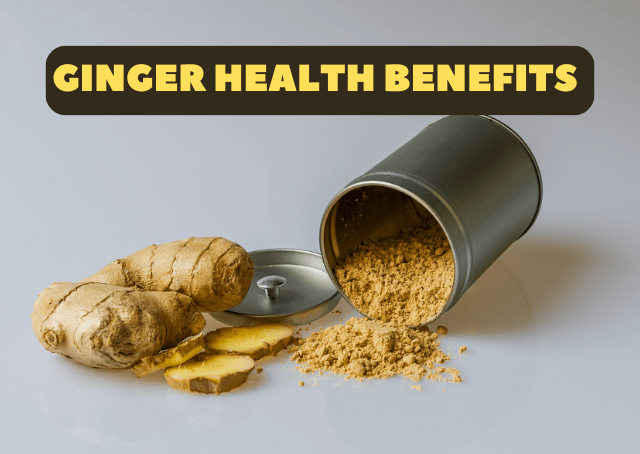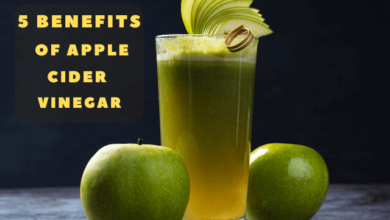15 Best Ginger Health Benefits

Best Ginger Health Benefits
Ginger, known for its pungent aroma and distinctive flavor, has transcended its culinary fame to become a potent natural remedy. With a rich history rooted in traditional medicine, ginger’s health benefits have not only stood the test of time but have been reinforced by scientific research. This article delves into the comprehensive spectrum of advantages ginger brings to the table, exploring its potential to improve various aspects of well-being. Ginger Health Benefits
Table of Contents
Nutritional Profile of Ginger
Ginger is not only prized for its spicy zing but also for its remarkable nutritional content. Bursting with essential vitamins and minerals, ginger is a powerhouse of health-enhancing compounds. A 100-gram serving of ginger offers around 80 calories, primarily sourced from carbohydrates. This humble root contains vital nutrients such as:
- Unlocking the Power of Vitamin C: Empowering Your Immune System and Nurturing Radiant Skin.
- Vitamin B6: Essential for brain health and involved in over 100 enzyme reactions in the body.
- Potassium: Plays a pivotal role in the regulation of both blood pressure and the balance of bodily fluids.
- Magnesium: Essential for the proper functioning of muscles and nerves, while also contributing to the overall health and strength of bones.
Ginger also owes its distinctive flavor to its bioactive component called Ginger, which contributes not only to taste but also to its potential health benefits.
Anti-Inflammatory Properties
Ginger’s remarkable anti-inflammatory prowess stems from its high Ginger content. These compounds act as powerful antioxidants, neutralizing harmful free radicals that contribute to chronic inflammation. By curbing inflammation, ginger has the potential to alleviate symptoms of various inflammatory conditions, including osteoarthritis and rheumatoid arthritis. Its effects are akin to a soothing balm for the body, providing relief and promoting overall comfort. Ginger Health Benefits.
Digestive Aid
From easing a queasy stomach to promoting efficient digestion, ginger has a long-standing reputation as a digestive ally. It stimulates the production of digestive enzymes that aid in breaking down food, making nutrient absorption more effective. Moreover, ginger helps to relax the muscles of the gastrointestinal tract, reducing instances of bloating, gas, and indigestion. Whether consumed as ginger tea, grated over meals, or in supplement form, this versatile root supports a harmonious digestive experience.
Nausea and Motion Sickness Relief
Ginger’s ability to quell nausea is not just an old wives’ tale. Scientific research has substantiated ginger’s effectiveness in alleviating nausea and vomiting, making it a valuable remedy for various scenarios. Pregnant women experiencing morning sickness, individuals undergoing chemotherapy, and even those prone to motion sickness can find solace in ginger’s natural soothing properties. By acting on the digestive system and central nervous system, ginger offers a gentle and holistic approach to combating queasiness.
Pain Management
When it comes to pain management, ginger steps up to the plate as a natural alternative. The Ginger compounds that lend ginger its spiciness also possess analgesic properties. These compounds inhibit pain pathways, providing relief to individuals dealing with chronic pain, muscle soreness, and even menstrual discomfort. Incorporating ginger into your routine can be seen as a proactive step towards embracing a natural pain-relief strategy.
Immune System Support
Your immune system’s vigilant protection is further fortified by ginger’s immune-boosting properties. The antioxidants present in ginger, including Ginger, are adept at neutralizing harmful molecules and bolstering the body’s defense mechanisms. Regular consumption of ginger can contribute to reduced susceptibility to infections and a faster recovery should illness strike. It’s like giving your immune system a boost of vitality to keep you resilient year-round.
Heart Health
Ginger’s benefits extend to matters of the heart. By positively impacting various risk factors for heart disease, ginger contributes to cardiovascular well-being. Its anti-inflammatory properties play a role in reducing the risk of atherosclerosis, while its potential to lower blood pressure and improve cholesterol levels adds to its heart-protective effects. Incorporating ginger into a heart-healthy lifestyle can be a flavorful way to care for your cardiovascular health.
Managing Blood Sugar Levels
Ginger emerges as a potential ally in managing blood sugar levels, particularly beneficial for individuals with type 2 diabetes. Research suggests that ginger enhances insulin sensitivity, facilitating better glucose control. By moderating blood sugar spikes after meals, ginger may contribute to long-term glycemic management. It’s a natural strategy that holds promise for those seeking holistic approaches to diabetes management. Ginger Health Benefits.
Weight Management
For those on a weight management journey, ginger’s metabolism-boosting properties offer a helping hand. By enhancing thermogenesis—the body’s calorie-burning process—and curbing hunger cravings, ginger supports weight loss efforts. Its ability to create a feeling of fullness and satisfaction can aid in reducing overall calorie intake. Incorporating ginger into your meals can be a flavorful strategy to complement your fitness goals. Ginger Health Benefits.
Cancer-Fighting Potential
While research is ongoing, ginger exhibits potential in the realm of cancer prevention. Certain compounds in ginger, including Ginger, possess antioxidant and anti-inflammatory properties that may inhibit the growth of cancer cells. Studies have shown promising results in slowing the proliferation of colorectal and ovarian cancer cells. Although more research is needed, ginger’s potential as a natural cancer-fighting agent is a compelling avenue of exploration.
Skin Benefits
Ginger’s impact isn’t limited to internal health—it extends to your skin’s radiance and vitality. Its antioxidant and anti-inflammatory properties make it a natural asset in promoting healthy skin. By neutralizing free radicals and reducing inflammation, ginger can contribute to a more even skin tone, improved complexion, and a youthful glow. Whether used topically or consumed, ginger offers a multi-faceted approach to achieving radiant skin. Ginger Health Benefits Tea.
Hair Health
Ginger’s benefits also extend to the realm of hair care. With its rich blend of minerals, vitamins, and fatty acids, ginger can enhance hair health from the roots to the tips. By improving scalp circulation, ginger encourages hair growth and promotes the delivery of essential nutrients to the hair follicles. The result? Stronger, shinier, and more luscious locks that radiate vitality.
How to Use Ginger
Incorporating ginger into your daily routine is a creative endeavor that offers both flavor and health benefits. Here are some delightful ways to introduce ginger into your life:
- Ginger Tea: A soothing concoction made by steeping fresh ginger slices in hot water, delivering warmth and comfort.
- Culinary Delights: Add grated ginger to stir-fries, soups, curries, and marinades for an aromatic punch.
- Smoothies: Blend fresh or powdered ginger into your favorite smoothie for an invigorating twist.
- Baked Goods: Elevate your baked goods by incorporating ginger powder into cookies, muffins, and more.
- Ginger Shots: A concentrated dose of ginger’s benefits, ginger shots provide a quick and potent health boost. Ginger Health Benefits.
Precautions and Considerations
While ginger is generally safe for most individuals, a few precautions are worth noting:
- Moderation: Excessive ginger consumption may lead to digestive discomfort, so moderation is key.
- Medication Interactions: If you’re taking blood-thinning medications or have a history of gallstones, consult a healthcare professional before increasing ginger intake.
- Allergies: There’s a possibility that certain individuals might encounter allergic responses to ginger consumption. Should you observe any unfavorable?

Unveiling the Vitamin-Rich World of Ginger
Ginger, scientifically known as Zingiber officinale, is not only prized for its warm and spicy flavor but also for its nutrient content. Among the essential nutrients that ginger contains, vitamins stand out as key contributors to its potential health benefits.
| Vitamin Content in Ginger | Vitamin Role and Benefits |
|---|---|
| Vitamin C | Boosts immunity, supports skin health, aids collagen synthesis |
| Vitamin B6 | Acts as an antioxidant Protects cells from oxidative stress |
| Vitamin E | Acts as an antioxidant Protects cells from oxidative stress |
| Vitamin A | Enhances vision, promotes skin health, aids in cell regeneration |
Vitamin C: Boosting Immunity and Beyond
Vitamin C, a powerful antioxidant, is present in ginger in appreciable amounts. This vitamin plays a vital role in supporting the immune system, promoting skin health, and aiding in collagen synthesis.
Vitamin B6: Supporting Metabolism
Ginger also provides a notable dose of vitamin B6, which is involved in various enzymatic reactions linked to metabolism. This vitamin contributes to the body’s energy production and cognitive function.
Vitamin E: Antioxidant Powerhouse
Known for its antioxidant properties, vitamin E in ginger helps protect cells from oxidative stress. It also supports skin health, enhances immune function, and may contribute to cardiovascular well-being.
Vitamin A: Nurturing Vision and Skin Health
The presence of vitamin A in ginger offers benefits for vision, particularly in low-light conditions. Additionally, vitamin A promotes healthy skin by assisting in cell regeneration.
The Synergistic Effect of Ginger’s Vitamins
The combination of these vitamins in ginger creates a synergistic effect, where their individual benefits complement each other. This underscores the holistic nature of ginger’s nutritional value.
Incorporating Ginger Health Benefits into Your Diet
Adding ginger to your diet can be as simple as using it as a spice in various dishes. Whether in its fresh, powdered, or dried form, ginger adds flavor and potential health perks to meals and beverages.
Ginger Supplements Ginger Health Benefits: A Convenient Alternative
For those seeking the benefits of ginger without incorporating it directly into recipes, ginger supplements are available. These supplements provide a concentrated dose of ginger’s vitamins and bioactive compounds.
FAQs
1. Can ginger help with menstrual pain?
Yes, ginger’s anti-inflammatory properties may help alleviate menstrual pain.
2. Is ginger safe to consume during pregnancy?
In moderate amounts, ginger is generally considered safe during pregnancy and can help with nausea.
3. Can ginger be used to treat migraines?
Some studies suggest that ginger may have migraine-relieving properties, but individual responses may vary.
4. Does ginger interact with medications?
Ginger may interact with certain medications, especially blood thinners, so it’s advisable to consult a doctor.
5. How much ginger is recommended daily?
Around 1 to 1.5 grams of ginger (about half of one teaspoon) is often recommended for daily consumption.




